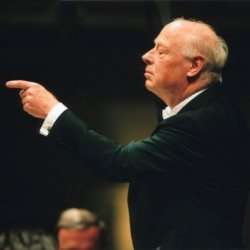|
Back
The Lights of Vienna New York
Avery Fisher Hall, Lincoln Center
10/21/2009 - & October 23, 25, 2009 (different works)
Franz Schubert: Symphony No. 5 in B-flat major, D. 485
Gustav Mahler: Symphony No. 4 in G major (“Ode to Heavenly Joy”)
Great Performers Series
Miah Persson (Soprano)
London Symphony Orchestra, Bernard Haitink (Conductor)

B. Haitink (© London Symphony Orchestra)
The London Symphony Orchestra and Bernard Haitink are always reliable, and their partnership for the first of three Mahler-accented concerts is certain to please concertgoers who loathe surprises. Sometimes, though, a few jolts, a few “bad” tempos or over-dominating orchestral soloists adds the spice to an otherwise respectful brew.
The opening concert had that one jolt, but she didn’t appear until the very last eight minutes of the performance. Before that, Mr. Haitink played two relatively light works of Schubert and Mahler with even temperament, passing charm and musical prudence.
Was this enough? Certainly the London Symphony Orchestra played with its usual color and expertise. But the LSO sometimes must be primed to excel. Previn did it, Boulez could do it, but Mr. Haitink simply let them play according to the score. The opening was suitably sunny and the LSO strings played that delicious second theme with some charm. He had his moments in the jaunty third movement (with a down-to-earth peasant tune). At the end, one felt a great respect for conductor and ensemble. But never was Schubert’s teenage joy (“I’m gonna live forever…”) or the feeling of spontaneity.
Mr. Haitink is rightly praised as a Mahler exponent, but the excellence of this performance was clearly due to the LSO players. The first two movement possess the charm of springtime, the natural sounds of a walk in the woods. Mahler perhaps envisioned it as a bucolic interlude, but Dvorák would have swooned over it. The LSO horn players, clarinetists, flutists and oboists had a literal field day playing the essence of flora and fauna. These two movements were like a trek in the wilds with Scoutmaster Mahler, and nothing could be more pleasant.
The slow movement is the test here. Mahler never draws away from his sunny disposition, but he himself described its black moments. “The sky doesn’t become overcast, but one suddenly takes fright, just as on the most sunlit day one cam become seized with terror or panic.”
Parts of this terror are here, especially that huge climax with all instruments climbing in, looking for a way to resolve one great chord. Mr. Haitink gave an honest playing. It was sometimes sublime, never quite dramatic enough.
Whatever qualms one had about the performance were brushed aside–no, they floated aside on wings of utmost delight–when Swedish soprano Miah Persson sung the strophic “Heavenly Life”. Her reputation in the Met’s Rosenkavalier preceded her, but I was astonished here. One expected an ethereal, almost distant singing of these medieval lyrics. Instead, Ms. Persson sometimes almost recited, sometimes chanted, always made clear with parlando drama that of which she was singing.
With the repetition of the last Elysian lines of each strophe started, her voice was full, utterly beautiful and with all the blissful temperament of which great concerts are created.
Harry Rolnick
|